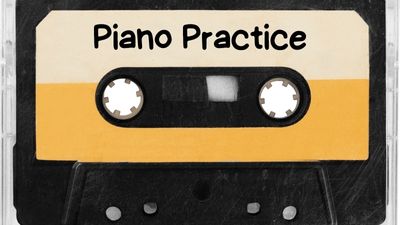If you’ve spent any significant time learning to play the piano, you know that it’s an incredibly rewarding experience, but it can also be challenging.
For aspiring pianists who want to speed up their progress, there are some key strategies that you can take to make the learning process more efficient and effective. Here are some tips and strategies for aspiring pianists who want to improve their piano skills:
- Establish a Daily Study Routine
One of the most important things that an aspiring pianist can do is establish a regular study routine. Setting aside a specific time each day for your piano study can help to make your piano study a habit and ensure that progress is being made consistently.

It is also important to be realistic about the amount of time that can be dedicated to practice each day, as it is better to practice for a shorter period of time consistently than to have sporadic, longer practice sessions.
This is referred to as “spaced repetition” and is an effective way to learn because it gives your brain a rest and allows your mind to be fresh as you study in more frequent intervals.
- Focus on Fundamentals
When learning to play the piano, it is important to focus on the fundamentals. This not only includes things like proper hand positioning, finger placement, and posture. It also includes studying basic chords, keys of music, chord progressions and rhythms.
Paying attention to these basics can help to ensure that a strong foundation is being built and can make more advanced techniques easier to learn in the future.
- Learn Music Theory (aka the mechanics of music)

Music theory is an important component of learning to play the piano. This is essentially how music works. Having a good practical knowledge of music theory gives you the tools to understand the elements of music and why it works the way it does in the music you’ve always listened to. Music theory also gives you the tools create your own compositions that are unique to you but also makes sense to other listeners.
4. Use a Metronome
Using a metronome can help to improve timing and rhythm when playing the piano. This tool can be especially helpful for beginners who are still learning to keep a consistent tempo. It is important to start slow and gradually increase the speed over time, rather than trying to play too fast too soon. When you mix a fast and slow amount of piano playing in the same piece of music, it sounds abrupt and unnatural. Playing at a steady pulse helps to solve this problem.
- Listen to Music
Listening to music can be a great way to improve your piano playing skills. Even though you may be sight reading or playing from a chord chart. It’s extremely beneficial to know how a song is supposed to sound in your head. I can attest that is alone makes learning a new song easier because your ear will tell you if what you’re playing doesn’t sound right in respect to the song.

Paying attention to the way that professional pianists play and what they interpret from different pieces of music can help to develop a better understanding of musical phrasing and dynamics.
It is also important to listen to a variety of different styles of music, as this can help to broaden your musical knowledge and inspire creativity.
- Practice Keys of music and Exercises
Keys of music are also known as scales. The word scale alone conjures up negative feelings from former traditional piano students and exercises can be tedious. But they are an important part of developing piano playing skills. Studying keys of music and exercises based on them can help to improve finger strength and dexterity.
Exercises can also help to improve specific techniques like arpeggios or chord progressions. Incorporating these into practice sessions can help to build a strong foundation for more advanced playing.
- Work with a Piano Teacher or Coach
Gaining knowledge from a piano teacher or coach can be an incredibly valuable experience for aspiring pianists. This doesn’t necessarily have to be the traditional piano teacher/student weekly lesson. This can be access to online coaching or lessons from an instructor that can give you guidance to achieve your goals as an aspiring piano player.
We can all benefit from guidance and feedback on technique, help identifying areas for improvement, and suggestions for pieces to work on that are appropriate for your skill level. They can also provide motivation and support, which can be especially helpful for beginners who may struggle with self-motivation.
- Record Practice Sessions
Recording practice sessions can be a helpful way to identify areas for improvement. Listening back to recordings can help to identify mistakes, notice patterns of inconsistency, and track progress over time. It can also be a helpful tool for working on specific sections of a piece that may be particularly challenging.

Even though the old fashioned tape recorder at your piano will work just as well as it did back in the old days, the technology of today provides way more options that way back then. Your instrument may have on board recording or sequencing. You also have access to devices such as computers and smartphones that are also capable of recording your study sessions.
- Join a Piano Community
Joining a piano community can be a great way to connect with other pianists and share experiences. This can include joining online forums or social media groups, attending recitals and concerts, or taking part in piano competitions. Being a part of a community can provide motivation and inspiration, and can also provide opportunities to learn from more experienced players.
- Have Fun!
Above all, it is important to have fun when learning to play the piano. If you’re not enjoying your journey in music at the keyboard, you won’t stick with it. It’s true that many children are forced to endure weekly piano lessons that they would rather not partake of. But you’re more likely an adult if you’re reading this.
It’s my opinion that your enjoyment is a very important part of the process. Even though time and effort are necessary, you’ll learn to enjoy the process even more when you have a breakthrough and make it to the next level.
11. Bonus Tip: Find a Creative approach to learning
If you’re a former traditional piano student like myself, you may have some of the same reservations about beginning another music journey at the piano. Many aspiring piano players take piano lessons that are designed for classical repertoire. This isn’t a good fit if playing popular/contemporary music is your goal.

Traditional piano lessons place a heavy focus on reading music and music theory that takes you through a series of method books that last for years. On the other hand, if learning popular music is your goal, a creative approach to learning is more fun and interesting.
For example, how do you learn the formula for a Major scale? Use the acronym: Windy Weather Has Worsened While Walking Home. W = whole step. H = half step. It’s not traditional but it’s creative.
You can also learn to play piano with lead sheets and chord charts instead of the process of reading every note of a traditional piece of sheet music. Throw in some rhythm patterns based on the chords of a song, and you have an arrangement that you can play virtually any popular song with.

If you’re interested in a creative and visual learning process like I just described, visit this page and learn about a visual chord system called Color Score.
There you have 10 Practical Strategies and a bonus on how to accelerate your piano learning journey. Get started now!
Greg Lee
Latest posts by Greg Lee (see all)
- What is a minor/Major 7 Chord? - October 26, 2023
- 7 Chord Substitutions that Professionals Use - October 19, 2023
- 5 Simple Chord Tricks to Sound Amazing - October 5, 2023




